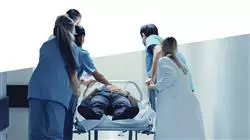University certificate
The world's largest faculty of medicine”
Introduction to the Program
With this Postgraduate diploma, you will be able to renew your knowledge and make it compatible with your professional responsibilities"

The objective of this Postgraduate diploma is to provide medical professionals with an update in their knowledge about the diagnosis of patients who come to the emergency department with pathologies in which it is necessary to clearly distinguish from the beginning whether they are organic or psychiatric. Likewise, the teaching team that makes up this program will provide professionals with the latest treatments applied to those patients who come to the emergency department with clear symptoms of intoxication.
A teaching that introduces health professionals to the different clinical pictures that they may encounter in their daily practice. A simulation of real cases provided by a teaching team specialized in this health area, which will allow, for example, doctors to update their knowledge of brain damage that can directly or indirectly cause a picture of Delirium or Confusional Syndrome.
Likewise, the students will obtain a renewal of knowledge on the main characteristics and elements that the anamnesis should contain to be able to guide the health professional on the organic causes or the use of toxic pollutants by the patient and the risk factors that they present.
A Postgraduate diploma taught 100% online that provides health professionals with a renewal of all their knowledge about Psychiatric Emergencies, allowing them to balance their work responsibilities with a high-level education provided by a specialist in the area. Therefore, students will be able to access at any time of the day, with no fixed schedule of sessions, to all the multimedia content and practical cases provided by the teaching team that has developed this university program. All they need is a device with an Internet connection from which they can access the virtual platform 24 hours a day.
This 100% online program will provide you with the latest techniques used in the detection of substance abuse emergencies"
This Postgraduate diploma in Psychiatric Pathology vs. Organic Pathology in Emergencies contains the most complete and up-to-date scientific program on the market. Its most notable features are:
- The development of practical cases presented by experts in Psychiatric Emergencies
- The graphic, schematic, and practical contents with which they are created, provide scientific and practical information on the disciplines that are essential for professional practice
- Practical exercises where the self-assessment process can be carried out to improve learning
- Its special emphasis on innovative methodologies
- Theoretical lessons, questions to the expert, debate forums on controversial topics, and individual reflection assignments
- Content that is accessible from any fixed or portable device with an Internet connection
Delve into the possible neurological causes that can affect a patient and determine the best treatment to apply"
The program’s teaching staff includes professionals from sector who contribute their work experience to this program, as well as renowned specialists from leading societies and prestigious universities.
The multimedia content, developed with the latest educational technology, will provide the professional with situated and contextual learning, i.e., a simulated environment that will provide immersive education programmed to learn in real situations.
This program is designed around Problem-Based Learning, whereby the professional must try to solve the different professional practice situations that arise during the course. For this purpose, the student will be assisted by an innovative interactive video system created by renowned and experienced experts.
Delve into this Postgraduate diploma in acute confusional syndrome from the hand of experts in this field"

Update your knowledge in the field of organic pathologies with this university program"
Why study at TECH?
TECH is the world’s largest online university. With an impressive catalog of more than 14,000 university programs available in 11 languages, it is positioned as a leader in employability, with a 99% job placement rate. In addition, it relies on an enormous faculty of more than 6,000 professors of the highest international renown.

Study at the world's largest online university and guarantee your professional success. The future starts at TECH”
The world’s best online university according to FORBES
The prestigious Forbes magazine, specialized in business and finance, has highlighted TECH as “the world's best online university” This is what they have recently stated in an article in their digital edition in which they echo the success story of this institution, “thanks to the academic offer it provides, the selection of its teaching staff, and an innovative learning method aimed at educating the professionals of the future”
A revolutionary study method, a cutting-edge faculty and a practical focus: the key to TECH's success.
The most complete study plans on the university scene
TECH offers the most complete study plans on the university scene, with syllabuses that cover fundamental concepts and, at the same time, the main scientific advances in their specific scientific areas. In addition, these programs are continuously being updated to guarantee students the academic vanguard and the most in-demand professional skills. In this way, the university's qualifications provide its graduates with a significant advantage to propel their careers to success.
TECH offers the most comprehensive and intensive study plans on the current university scene.
A world-class teaching staff
TECH's teaching staff is made up of more than 6,000 professors with the highest international recognition. Professors, researchers and top executives of multinational companies, including Isaiah Covington, performance coach of the Boston Celtics; Magda Romanska, principal investigator at Harvard MetaLAB; Ignacio Wistumba, chairman of the department of translational molecular pathology at MD Anderson Cancer Center; and D.W. Pine, creative director of TIME magazine, among others.
Internationally renowned experts, specialized in different branches of Health, Technology, Communication and Business, form part of the TECH faculty.
A unique learning method
TECH is the first university to use Relearning in all its programs. It is the best online learning methodology, accredited with international teaching quality certifications, provided by prestigious educational agencies. In addition, this disruptive educational model is complemented with the “Case Method”, thereby setting up a unique online teaching strategy. Innovative teaching resources are also implemented, including detailed videos, infographics and interactive summaries.
TECH combines Relearning and the Case Method in all its university programs to guarantee excellent theoretical and practical learning, studying whenever and wherever you want.
The world's largest online university
TECH is the world’s largest online university. We are the largest educational institution, with the best and widest online educational catalog, one hundred percent online and covering the vast majority of areas of knowledge. We offer a large selection of our own degrees and accredited online undergraduate and postgraduate degrees. In total, more than 14,000 university degrees, in eleven different languages, make us the largest educational largest in the world.
TECH has the world's most extensive catalog of academic and official programs, available in more than 11 languages.
Google Premier Partner
The American technology giant has awarded TECH the Google Google Premier Partner badge. This award, which is only available to 3% of the world's companies, highlights the efficient, flexible and tailored experience that this university provides to students. The recognition as a Google Premier Partner not only accredits the maximum rigor, performance and investment in TECH's digital infrastructures, but also places this university as one of the world's leading technology companies.
Google has positioned TECH in the top 3% of the world's most important technology companies by awarding it its Google Premier Partner badge.
The official online university of the NBA
TECH is the official online university of the NBA. Thanks to our agreement with the biggest league in basketball, we offer our students exclusive university programs, as well as a wide variety of educational resources focused on the business of the league and other areas of the sports industry. Each program is made up of a uniquely designed syllabus and features exceptional guest hosts: professionals with a distinguished sports background who will offer their expertise on the most relevant topics.
TECH has been selected by the NBA, the world's top basketball league, as its official online university.
The top-rated university by its students
Students have positioned TECH as the world's top-rated university on the main review websites, with a highest rating of 4.9 out of 5, obtained from more than 1,000 reviews. These results consolidate TECH as the benchmark university institution at an international level, reflecting the excellence and positive impact of its educational model.” reflecting the excellence and positive impact of its educational model.”
TECH is the world’s top-rated university by its students.
Leaders in employability
TECH has managed to become the leading university in employability. 99% of its students obtain jobs in the academic field they have studied, within one year of completing any of the university's programs. A similar number achieve immediate career enhancement. All this thanks to a study methodology that bases its effectiveness on the acquisition of practical skills, which are absolutely necessary for professional development.
99% of TECH graduates find a job within a year of completing their studies.
Postgraduate Diploma in Psychiatric Pathology vs. Organic Pathology in Emergencies
The differential diagnosis between organic and psychiatric pathologies in the emergency department is a constant challenge for healthcare professionals. Therefore, up-to-date knowledge in both fields is necessary to be able to identify and adequately treat the patient. This Postgraduate Diploma in Psychiatric Pathology vs. Organic Pathology in Emergencies offers specific expertise in this field through a specialized teaching team, with years of experience in both clinical care and teaching in the field of emergencies. The program includes a comprehensive review of the pathologies that may present in the emergency department, as well as a detailed description of the most current diagnostic tools and techniques. In addition, you will address the treatment of poisonings and intoxications, providing professionals with the necessary information for immediate and effective intervention.
Master the diagnostic methods of Psychiatric and Organic Pathologies in Emergencies
Through this 100% online Postgraduate Diploma, you will be able to address cases of delirium and confusional syndrome, which can occur in patients with brain damage, and which require early diagnosis and specific treatment. You will also delve into the anamnesis, key to identify risk factors and underlying causes of pathologies that present in the emergency department.







